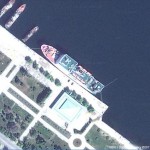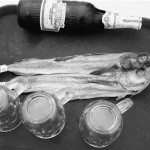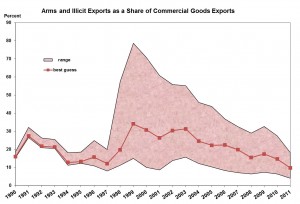

Pictured above: (L) Mangyongbong-92 in the Wonsan Harbor. (R) American Budweiser Beer and dried fish served on the Mangyongbong-92
UPDATE 3 (2013-2-26): The Singaporean ship, Royale Star, has been delivered to Rajin to handle tourist cruises. According to Google Earth imagery (2012-9-21), the Mangyongbong-92 has been returned to its primary port in Wonsan.
UPDATE 2 (2011-9-3): The Telegraph and ITN (UK) put together a humorous take on the cruise here.
UPDATE 1 (2011-8-31): According to the Associated Press:
The maiden voyage — a trial run — arrived Wednesday, carrying dozens of Chinese travel agents, international media and North Korean officials.
About 500 North Koreans lined up with military precision at the Rason port for a red carpet send-off Tuesday, waving small flags and plastic flowers while revolutionary marches such as “Marshal Rides a White Horse” blared over the loudspeakers. Streamers swirled and balloons spiraled skyward.
The Mangyongbong, a refurbished Japanese-built cargo ship with rusty portholes and musty cabins, was used for the 21-hour overnight cruise tracing the length of North Korea’s east coast. Some passengers slept on wooden bunkbeds while others were assigned mattresses on the floor. Simple meals were served cafeteria-style on metal trays.
A plaque on board commemorated a 1972 tour of the boat by North Korea’s founder, late President Kim Il Sung, and bright red posters emblazoned with his sayings decorated the walls.
Park promised a “more luxurious” ship capable of carrying up to 900 passengers, perhaps next year. He said the goal is to bring as many as 4,000 visitors a day from Rason to Mount Kumgang during the peak summer season, up from some 500 per week now.
“People from any country — Jamaica, Japan, Singapore, people from various countries — can come to Rason and don’t require a visa,” said Rason’s vice mayor, Hwang Chol Nam. “That’s the reality.”
But other restrictions remain. Hwang said visitors must book with approved travel agents and remain in their guides’ company throughout. Mobile phones must be left behind in China.
…
It remains to be seen how many Chinese tourists will be interested in the new tours. With incomes rising, Chinese are traveling abroad in rising numbers, thronging tour groups to Europe, Thailand, Japan and South Korea, with a small but growing number making the short trip to neighboring North Korea.
A rush of American visitors is unlikely. A long-standing U.S. State Department travel warning says North Korea strictly monitors visitors and harshly punishes law-breakers and reminds Americans that the two countries do not have diplomatic relations.
A senior South Korean official said North Korea would have trouble drawing investors and tourists after the way the North dealt with South Korean businesses.
South Korea’s Unification Ministry plans to send a letter to foreign embassies asking them not to cooperate with any new Diamond Mountain tours offered by North Korea, said the official, who spoke on condition that his name was not used.
North Korea’s latest moves are likely to upset Hyundai — but that might be the strategy of Pyongyang officials riding out conservative South Korean President Lee Myung-bak’s leadership, which ends next year, said Yoon Deok-ryong, an economist at the Korea Institute for International Economic Policy in Seoul.
“If they bring potential investors into the Mount Kumgang area, Hyundai would be upset and try to mobilize possible supporters in Parliament so the next government in South Korea will improve inter-Korean relations,” he said. “That is I think the design of the North Korean government.”
Wang Zhijun, a Chinese hotel manager from Jilin province who joined the trip free of charge, said it won’t be hard to sell the cruise to tourists in his region, which has a large ethnic Korean population and lacks coastline of its own.
But, he said, the price would have to stay low, suggesting around 2000 yuan (US$310) per passenger for an all-inclusive, five-day trip.
“It ought to be very popular. There are a lot of tourists already coming across to Rason,” Wang said. “People from China’s northeast would really like this kind of trip because it’s a cruise. You can enjoy the sea.”
The AFP also reported from the bosom of the Mangyongbong:
It has karaoke and fresh coffee, but the bathrooms on the lower decks are out of water and some guests sleep on the floor. Welcome aboard North Korea’s first cruise ship.
Keen to boost tourism and earn much-needed cash, authorities in the impoverished nation have decided to launch a cruise tour from the rundown northeastern port city of Rajin to the scenic resort of Mount Kumgang.
In a highly unusual move, the reclusive regime invited more than 120 journalists and Chinese tour operators on board the newly-renovated, 39-year-old Man Gyong Bong ship for a trial run of the 21-hour journey.
The vessel left one of Rajin’s ageing piers on Tuesday to the sound of rousing music, as hundreds of students and workers holding colourful flowers stood in line and clapped in unison.
“The boat was only renovated one week ago,” said Hwang Chol Nam, vice mayor of the Rason special economic zone, as he sat on the top deck at a table filled with bottles of North Korean beer, a large plate of fruit, and egg and seafood dishes.
“But it has already made the trip to Mount Kumgang and back. I told people to test the ship to make sure it was safe,” said the 48-year-old, dressed in a crisp suit adorned with a red pin sporting late leader Kim Il-Sung’s portrait.
The project is the brainchild of North Korea’s Taepung International Investment Group and the government of Rason, a triangular coastal area in the northeast that encompasses Rajin and Sonbong cities, and borders China and Russia.
Set up as a special economic zone in 1991 to attract investment to North Korea, it never took off due to poor infrastructure, chronic power shortages and a lack of confidence in the reclusive regime.
Now though, authorities are trying to revive the area as the North’s economy falters under the weight of international sanctions imposed over the regime’s pursuit of ballistic missiles and atomic weapons.
The country is desperately poor after decades of isolation and bungled economic policies, and is grappling with persistent food shortages.
In Rason, Hwang said authorities had decided to focus on three areas of growth — cargo trade, seafood processing and tourism.
North Korea has only been open to Western tourists since 1987 and remains tightly controlled, but more destinations are gradually opening up to tour groups keen to see the country for themselves.
Mount Kumgang, though, is at the heart of a political dispute between North and South Korea after a tourist from the South was shot dead by a North Korean soldier in 2008.
And Rason, where the cruise begins, is a poor area. The tours are tightly monitored, and the only brief contact with locals is with guides, tourist shop owners and hotel employees.
Visitors can expect only brief glimpses of everyday life through the windows of tour buses, as locals — many dressed in monochrome clothing — cycle past or drive the occasional car in otherwise quiet streets.
Small apartment blocks, many of them run down, are interspersed with monuments to the glory of the country’s leaders.
A portrait of current leader Kim Jong-Il and his late father Kim Il-Sung greets visitors as they walk through the vast lobby of the large, white hotel in Rajin.
“The book is a silent teacher and a companion to life,” reads a quotation from the late Kim, hung over glass cases full of books about North Korea, with titles like “The Great Man Kim Jong-Il” and “Korea — a trailblazer.”
The rooms are spartan but clean. But there is no Internet connection anywhere in the area, and the phone lines are unreliable and expensive. Foreign mobile phones are confiscated by tour guides as travellers enter the country.
Hwang said the government in Rason was trying to address communication problems and had signed a 26-year exclusive agreement with a Thai firm to set up Internet in the area, which he hoped would be running in September.
He acknowledged, however, that non-business related websites would likely be blocked, with the media tightly controlled in North Korea.
Many of Rason’s tourists come from neighbouring China. The area sees an average of 150 travellers from China every day during the summer peak season.
One Chinese national from the southeastern province of Fujian who gave only his surname, Li, said he had come to North Korea after a business meeting on the Chinese side of the border.
“We’ve come here mainly to see what changes there have been compared to our country… I like to go to places I’ve never been to before,” he said, standing in front of a huge portrait of Kim Il-Sung.
Simon Cockerell, managing director of Koryo Group, a Beijing-based firm that specialises in tours to North Korea, conceded that Rason may not be everyone’s idea of a holiday, but said its attraction lay in the unknown.
“A lot of people like going to obscure places. And this is the most obscure part of a very obscure country in tourism terms — the least visited part of the least visited country,” he said.
Back on the boat, Chinese tour operators sang karaoke in a dining hall decked out with North Korean flags as a waitress made fresh coffee, while guests drank beer and ate dried fish at plastic tables up on deck.
Inside, some cabins were decked out with bunk beds, while others just had mattresses laid out on the floor. The better rooms had tables, chairs and private washrooms.
Water in bathrooms on the vessel — used as a ferry between North Korea and Japan until 1992 when it started shipping cargo — was unreliable and when available, was brown.
But Park Chol Su, vice president of Taepung, said he had big plans for the tour if it attracted enough visitors.
He wants to invite more than 100 tourist agencies from Europe in October to sample the same trip, in a bid to attract travellers from further afield.
Authorities have promised no visas will be needed to go on the cruise and, if all goes to plan, the ship will be upgraded to a more comfortable one.
“Next year, we aim to get a bigger, nicer boat that can accommodate 1,000 people. We’d rent that from another country in Southeast Asia,” he said.
Some great photos of the trip are here.
A timeline of Kumgang stories from the shooting until today can be found here.
Read the full story here:
North Korea starts group tours from China to mountain resort formerly operated with South
Associated Press
2011-8-31
ORIGINAL POST (2011-9-7): The Mangyongbong-92 is going to be used for tourism. According to Yonhap:
North Korea appears likely to use a ferry to try to attract foreign tourists, a source familiar with the issue said Friday, in what could be an attempt to earn much-needed hard currency.
For decades, the Mankyongbong-92 served as the only shuttle between North Korea and Japan, which have no diplomatic relations, and was mostly used by pro-North Korean residents in Japan.
The 9,700-ton ship was later used to transport cargoes before Tokyo blocked its entry as part of economic sanctions over Pyongyang’s missile and nuclear tests in 2006.
The ferry has also been suspected of being used for trafficking drugs, counterfeit money and other contraband goods.
North Korea is now preparing to use the vessel as a cruise ship for Chinese and other foreign businessmen during an upcoming international fair in Rason, the country’s special economic zone near China and Russia, the source said.
The North plans to use the ship to take the businessmen on a sightseeing trip in waters off the economic zone at the end of the international fair later this month.
The move is widely seen as the North’s attempt to use the ship for its tourism project.
“It is meaningful in that the Mankyongbong-92 would set sail as a cruise ship for the first time,” said Cho Bong-hyun, a researcher at the IBK Economic Research Institute, noting the North seems to be revitalizing tourism in the economic zone and attempting to attract Chinese tourists to earn hard currency.
The North designated Rason as a special economic zone in 1991 and has since striven to develop it into a regional transportation hub, though no major progress has been made.
…
Read the full story here:
N. Korea pushing to use ferry to attract foreign tourists
Yonhap
Kim Kwang-tae
2011-8-5



